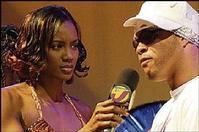Mel Cooke, Freelance Writer


Left: HICKLING - CONTRIBUTED
Right: Television presenter, Denise Hunt, defined a star financially in a recorded interview for the Bob Marley Lecture entitled 'Wi Neva Know Wi Wudda Reach Dis Far: The Psychology of Stardom in Jamaican Popular Culture'. In this photo, Hunt interviews Noddy Virtue, who placed second in TVJ's Rising Stars competition.
THERE WAS subdued laughter in the social sciences lecture theatre at the University of the West Indies (UWI), Mona campus, on Friday evening when Professor Frederick Hickling described Jamaica's first Governor as a thief and murderer.
Henry Morgan was not the end point of the annual Reggae Studies Unit's Bob Marley Lecture, entitled 'Wi Neva Know Wi Wudda Reach Dis Far: The Psychology of Stardom in Jamaican Popular Culture'.
He seemed to be a point of convergence between coloniser and colonised as Hickling, head, section of psychiatry, department of community health and psychiatry, traced the culture of 'stardom' from the delusions of the Europeans.
And while the focus was on entertainers, the concept of stardom was not restricted to those on the big stage.
In a heavily audio-visual supported presentation Herbie Miller, who along with Colin Leslie gave his views in a recorded interview, said "it is the ambition of most Jamaicans to 'buss', to be a star".
Away from drum and bass, there was somewhat extensive treatment of Professor Rex Nettleford.
The presentation began with a clip of Bounty Killer defining himself as an 'all-star'.
Marley's Jammin' was the first of many songs for the evening, Hickling putting two fingers in the air for Every Nier Is a Star, saying that Boris Gardiner had a version, as did Supercat with his own lyrics.
STARDOM IN CONTEXT
"We have to see it (stardom) in the Jamaican context," Hickling said, introducing and explaining the term 'psychohistoriography', basically the historical development of a mindset, to the music of Burning Spear's Slavery Days.
"European colonisation of the New World is based on a delusional idea," Hickling said.
He defined delusion as a "fixed false belief". The European delusion was that they 'discovered' the New World, and hence "all I see is mine and everything I see belongs to me".
"If I went to New York and said all I see is mine, they would lock me up in Bellevue Hospital," Hickling said, to laughter.
Any rational argument against the delusion was met with genocidal eradication.
Referring to Beckford's Persistent Poverty, Williams' Capitalism and Slavery and Hall's Legacy of Torture and Violence, Hickling showed how murderous slavery was.
"We see that theme coming out through the music: murderer, murderer, murderer," he said.
After going through the history of resistance to the delusion and then its most current form, the holy invocation to kill Chavez and the war on Iraq, Hickling said that stardom is an expression of the encapsulation of European delusion.
One person who was not deluded, though, was Peter Tosh, about whom Miller said "it was difficult to reach beyond the 'buss'."
"What made it more difficult was to make him seen as a star, as it is a term he did not like," Miller said.
FINANCIAL DEFINITION
Another speaker Denise Hunt defined a star financially in a recorded interview.
She referred to a star as someone who rolls up in a posh current car for which they are not making payments, who has a house or houses and somebody to take care of the handbag.
"I am more of a celebrity," Hunt declared.
PHASES OF JAMAICAN MUSIC
Hickling went through the various phases of Jamaican music, naming stars in mento, ska, rocksteady, dub poetry, reggae and dancehall, among them Count Owen, Miss Lou, John Holt, Bob Marley, Mikey Smith, Beenie Man, Shaggy and Vybz Kartel.
"Stars are regular men and women," Hickling said.
"Our stars are courageous, charismatic, complex ... Egocentricity is key to stardom," he said later in the lecture.

















